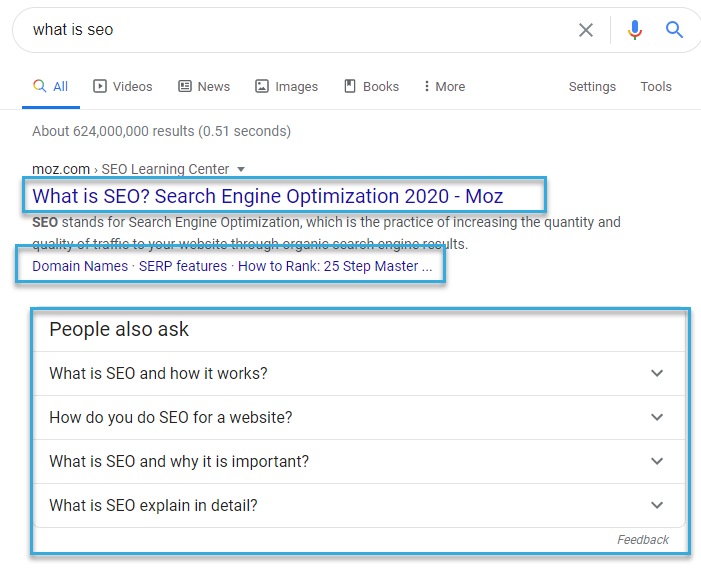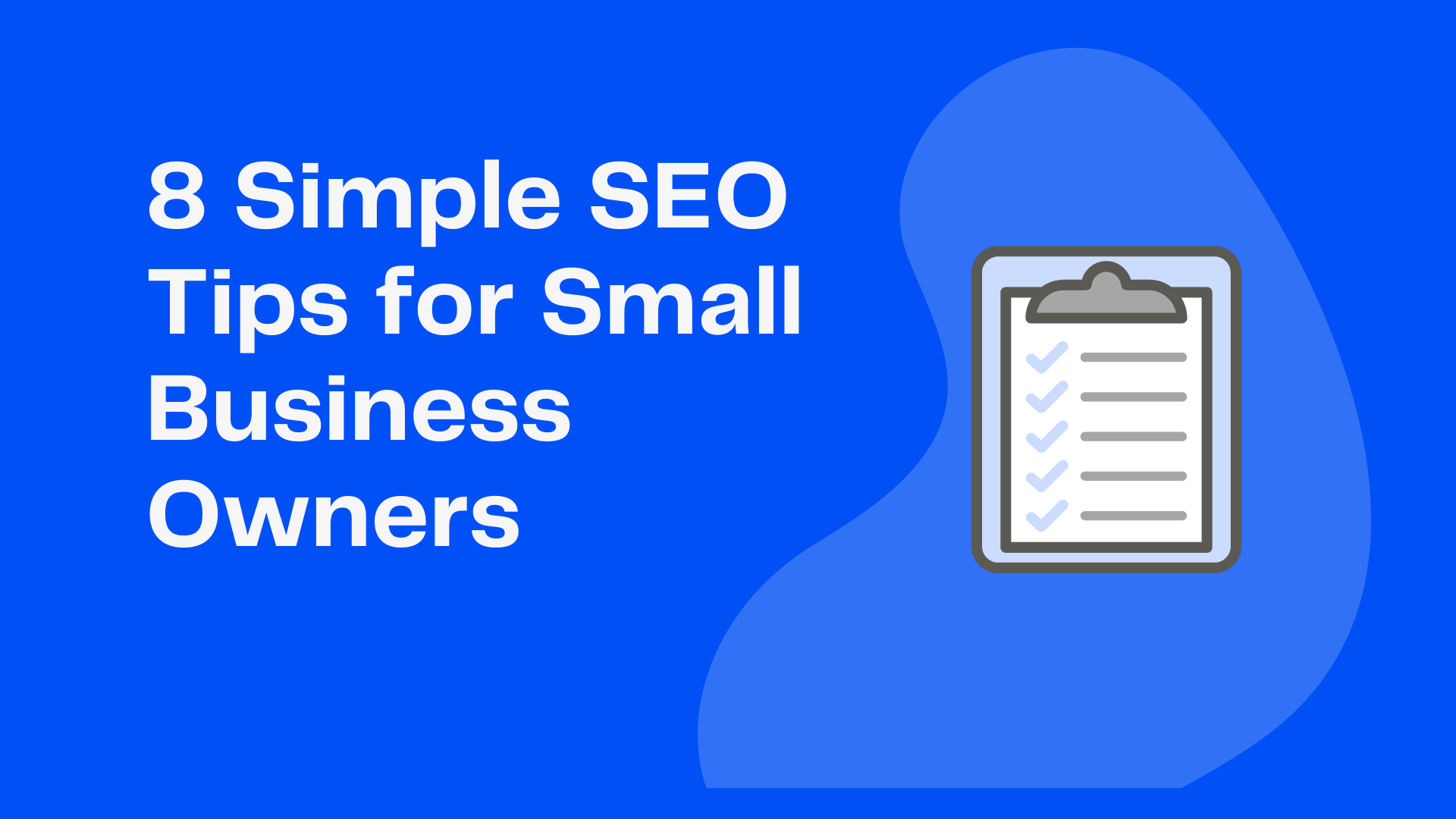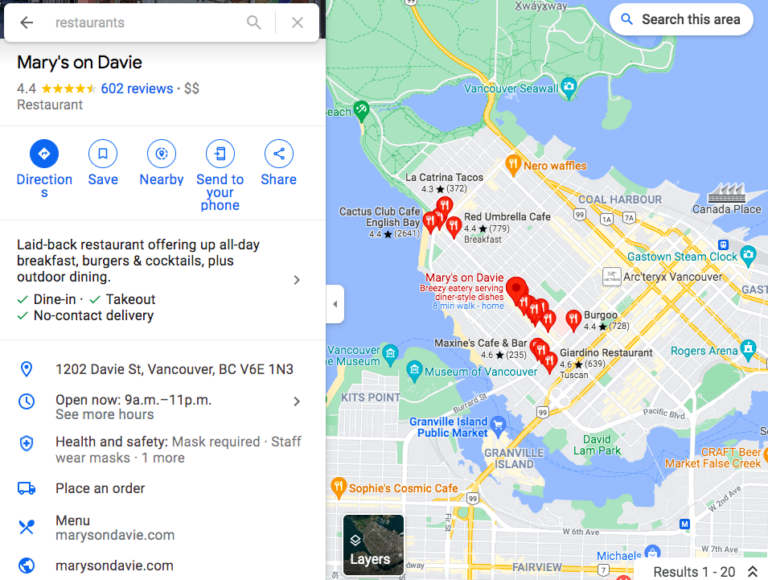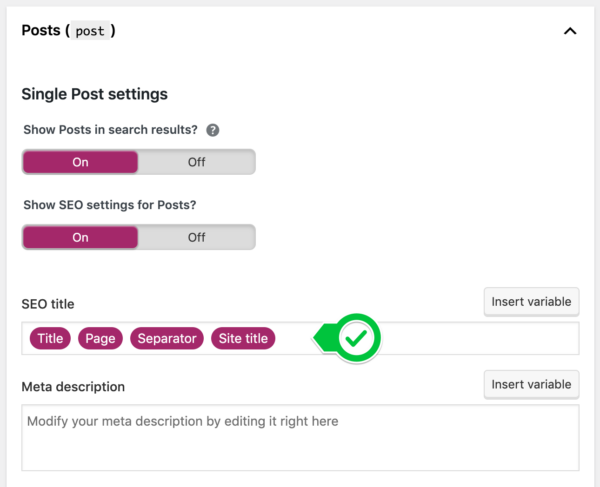Small Business SEO Tips That Drive Traffic and Get Results
With the cost of advertising going through the roof, small businesses struggle to keep up with such a competitive field. It is generally recommended to spend about 8% of your earnings on marketing, but is it really necessary to spend that much?
In the short term maybe. For businesses looking for a “light at the end of the tunnel” where they can alleviate these costs, turn to other solutions such as organic traffic.
Fortunately, we can help with that. Let’s talk small business SEO and how to build organic traffic for your business this year!
Search engine optimization is the process of modifying or building the content of your website according to the guidelines of search engines such as Google. Doing this will help your website rank better for relevant searches from your target audience.
Google uses “crawlers” to crawl and index billions of web pages every day, ranking them for different keywords that people search for. Then they use a few other factors from the user’s search and the websites that match those keywords to determine their ranking. This is why you won’t see any digital marketing agencies when you search for “ice cream near me”.
Well, appearing at the top of a Google search has some serious benefits. The difference between the bottom of the first page and the top of the second page is huge in terms of driving traffic, so websites have to compete with each other to optimize their content for these searches. So, is it worth it?
SEO is unlike any other digital marketing strategy, especially paid advertising. Sure, it takes some time to build the strategy, but once it’s up and running, you can reap the benefits for years to come with minimal maintenance. Little to no additional costs are required.
Once the content is on your website, you don’t have to spend a penny extra, no matter how much organic traffic it brings in. Plus, organic traffic is simply superior to paid traffic. Think about it.
When you search on Google, how often do you skip the search ads in favor of the organic results? Most people do that because they trust these results more. Starting their journey with the first sign of trust can lead to higher conversion rates, user retention, and brand loyalty.
Finally, one of the best advantages is the lack of competition. While SEO is definitely a buzzword in the marketing world, 70% of businesses still don’t have an SEO strategy in place, making it much easier to get ahead now than it ever will be!
Before we discuss how to use SEO in your marketing strategy, there are some important basics you should know. These are the main pillars of a small business SEO strategy.
Keywords are a fundamental pillar of your SEO strategy, so don’t neglect your keyword research. Google uses keywords to match users with the right content, and if those keywords aren’t present in your website’s content, how will Google know to rank you?
Ideally, you want to diversify your keyword strategy as much as possible, especially with both long-tail and short-tail keywords. If you are not familiar with the terms, short tail keywords are the obvious ones in any industry you want to rank for. For example, it would be a great boon for a car dealer to rank for the keyword ‘used car’.
However, getting a local dealer to compete with industry giants like KBB, Edmunds and others would be an uphill battle. That’s why you should think of short-term keywords as a long-term goal.
In the meantime, focus on diversifying your long-tail keywords. These may have less search volume, but they also have significantly less competition standing in your way. Look for keywords with the highest possible search volume and the lowest relative competition for the best results.
Most small businesses rely primarily on local traffic and customers to stay in business. Certainly not all, but most of them.
If you rely heavily on local businesses, it’s important to use local SEO principles to maximize your local traffic. For starters, using location-specific keywords can go a long way. When users search for keywords like “pizza shop” or “dry cleaners,” search engines assume their intent is to find nearby locations, so they use location as a ranking factor.
For that reason, it’s important to use keywords that end with terms like “in LA” or “near me.” In addition, be as clear and consistent as possible both on your website and beyond (social media, company profiles, directories, etc.) about your location and contact details. This allows you to confirm your location to Google.
Finally, if you have an established establishment, such as a shop or office, add it to Google Maps and other popular GPS systems. This is another great way to drive organic traffic and a local customer base.
Google uses over 200 ranking factors specifically related to the quality of your website. Without a strong website you are building a house on a broken foundation.
The reason for this is simple; if search engines continued to promote low-quality sites to their users, it would be a poor reflection of their service. A modern website will help you stand out in the long run!
Google’s algorithm is excellent at many things, but it can’t immediately control everything it indexes. How would it know who is telling the truth and who is not? There is simply too much conflicting information online for this to be a viable approach to indexing.
For this reason, one of the most important aspects of off-page ranking is backlinks or the links from other sites to yours. These act as a vote in favor of your website and establish authority or credibility. The more authority and relevance that site has, the more authority it will provide to your site.
Sites with a lot of backlinks have a huge competitive advantage. If you’ve started a new blog and written the most comprehensive and informative article in the world about upcoming elections, a much less informative New York Times article will probably beat you to it. They receive links every day from news outlets around the world with high domain authority, which gives them a huge advantage.
Fortunately, Google doesn’t expect a new website to have backlinks. However, it is important to incorporate these into your strategy over time. More on that later.
Now that you understand some of the basics of an SEO strategy, it’s time to discuss its implementation. Here are some small business SEO tips that you can use in your strategy.
Since your strategy relies so heavily on your website, it’s best to build a good one ahead of time. Most importantly, your website must have:
The list goes on, but this is enough to get you pretty far! Once your pages are optimized, it’s a lot easier to grow your strategy from there.
Google strongly favored mobile-friendly sites as the majority of web traffic now comes from mobile devices. Make sure your web pages fit seamlessly on different screens before publishing new content.
Also, your bounce rate and load times will both play a role in your SEO prospects. With slow loading times, your bounce rate will increase, creating a “double whammy” for your strategy. Make sure that your technical SEO is optimized and that you are not using too many heavy files on your web pages to allow for faster loading times.
If you don’t know what the competition is doing, how can you ever stay ahead of them? Without competition research, you will remain a race in the dark. Fortunately, it’s easy to see where your competition is even without prior knowledge.
Your competition’s SEO strategy lies entirely in their website, which is available for you to analyze. Just go to your favorite SEO tool or keyword research tool and enter their URL to get a detailed analysis. Some of these tools are free for limited daily use, so do this one step at a time if you want to save money.
From there, browse their existing content to generate ideas and be sure to keep notes! Build a list of keywords and topics to compete for that you may have missed. This will help you develop new content, learn the industry standards and understand exactly what you are competing against.
Creating informative, engaging content should be your primary focus. After all, the whole purpose of search engines is to match users with relevant, high-quality content. If you offer that on an optimized website, you will eventually see SEO results.
Regardless of the type of content you create (audio, blog, video, etc.), remember that you are creating it for users, not search engines. Google knows every trick in the book and will eventually catch up on tactics like keyword padding, word count inflation, and more. You can beat the system, but not for long.
Once Google penalizes you for quality, the effects can last for a long time, even if you improve your content. We recommend that you always have something to say when you create content, review your content before publishing it, and remove anything that serves no purpose for your users.
When reviewing your content, remember to optimize your links, images, and everything else before publishing. This is the only part that is for search engines, as their algorithms rely heavily on context for images, infographics, videos, links, and other features.
Also be as consistent as possible. Posting weekly is great, but try to post several times a week for best results. SEO takes time to develop, but with the right amount of consistency, you’ll see results as quickly as possible.
Directory links and social media links are important for SEO, but they don’t really help build domain authority. If you want to get ahead of the competition, you need a backlink strategy. The sooner you start, the better.
There are many strategies for building backlinks, but not all of them offer guarantees. You can try contacting affiliates for links, offering link exchanges, or buying links. However, paid links will be penalized if they are discovered by Google, which they crack down on.
One of the best strategies for building links from other sites is to provide guest posts that link back to your target page. Providing a high-quality guest post to a blog with a high domain authority makes them more likely to run it. Blogs are always looking for quality content to post, and they are often willing to trade a link for compelling content.
Now that you have a handy guide to small business SEO, you can use it to your advantage. The sooner you put these tips into practice, the sooner you will see results. Remember that SEO is a marathon, not a sprint, so do your best and persevere!
Launch your small business SEO campaign today and stay tuned for our latest digital marketing news to learn more!
How do you increase your Google ranking for free?

Another tactic to improve your SEO google ranking for free is to focus on building quality content. Not only should it be SEO friendly with keywords, but it should also be well written and aim to grab your customer’s attention. Try to ignore all the traditional rules about writing content.
How can I improve my Google ranking in 2020? 12 Ways to Improve Your Google Rank in 2022
- Pick a URL and stick with it. †
- Check your current search ranking. †
- Check your site speed. †
- Start using Google Analytics. †
- Use the correct title tags. †
- Description tags. †
- Improve the site architecture. †
- Have a mobile or responsive site.
How much does it cost to rank #1 on Google?
The estimated CPC is $2,6600 searches times $2 cost per click times a 30% Click Thru Rate = $3,960. So, using the Google tools, we can estimate that we would pay $3,960 per month to become the #1 listing on Google for “Salon Nashville.” The annual value of that number 1 position on Google would be $47,520.
How much does it cost to be at the top of a Google search?
The average cost per click in Google Ads is between $1 and $2 on the search network. The average cost per click on the Display Network is less than $1. The most expensive keywords in Google Ads and Bing Ads cost $50 or more per click.
Can you pay for Google ranking?
Tip: It is not possible to request or pay for a better local ranking on Google. We do our best to keep the details of the search algorithm confidential, to make the ranking system as fair as possible for everyone.
How much does it cost to rank first page of Google?
I’ll start with the one word answer to the question “how much does it cost to get your website on Google?†FREE! It costs nothing. Google puts you on their website for free.
Is SEO good for small business?

If you are a small business trying to reach customers in your area, SEO is important because it allows them to find you first. 97% of people learn more about a local small business online than anywhere else (Source: SEO Tribunal).
What is SEO and how does it work for small businesses? SEO is the process organizations go through to ensure their site ranks high in organic results for relevant keywords and phrases. For example, let’s say you have an article about building a birdhouse. To get your content to the right people, you probably would.
How can a small business grow their SEO?
A quick SEO tip for small businesses is to make sure you fill in the metadata for your pages with SEO in mind. This includes the meta title tag, meta description, image alt text, and more. Use keywords in the title tag and meta descriptions to indicate relevance to Google and other search engines.
How a small business can grow their SEO?
Don’t ignore this fundamental step in the SEO process.” In summary, experts advise online businesses to conduct keyword research, research competitors, invest in regular blog content, improve site speed and generate backlinks.
How much should a small business pay for SEO?
How Much Does SEO Cost for Small Businesses? The average cost of SEO for small businesses is $750 to $2,000 per month or $5,000 to $30,000 for one-off projects. Smaller companies investing in SEO consulting services can expect to pay $80 to $200 per hour.
How much does SEO cost for small business?
According to a survey of 1,200 business owners and more than 350 agencies, freelancers and consultants, the average cost of SEO for Small Business is $501-$1,000 per month worldwide. The average cost of SEO for small businesses in the United States is $2,501 to $5,000 per month.
How much should I pay someone for SEO?
If you hire a top tier SEO company to run a local campaign, expect to pay $500 per month. A national or international campaign requires a minimum budget of $2,500 to $5,000 per month. Some companies offer a “trial pack” at a lower price, without a contract.
How much should I charge for local SEO services?
How much does local SEO cost on average? For a one time project focused on analysis, research, cleanup and optimization, the average price for a local SEO project would range from $300-$1500 with an average cost of around $750.
How much does SEO cost?
This study also found that the median cost per month for SEO was between $2,500 and $5,000 per month for SEO services. Thirty-one percent paid above this range, up to $50,000, and only 18% paid less than $1,000.
How much should a small business pay for SEO?

How Much Does SEO Cost for Small Businesses? The average cost of SEO for small businesses is $750 to $2,000 per month or $5,000 to $30,000 for one-off projects. Smaller companies investing in SEO consulting services can expect to pay $80 to $200 per hour.
How much should I charge for local SEO services? How much does local SEO cost on average? For a one time project focused on analysis, research, cleanup and optimization, the average price for a local SEO project would range from $300-$1500 with an average cost of around $750.
How much does SEO cost for small business?
According to a survey of 1,200 business owners and more than 350 agencies, freelancers and consultants, the average cost of SEO for Small Business is $501-$1,000 per month worldwide. The average cost of SEO for small businesses in the United States is $2,501 to $5,000 per month.
How much does SEO typically cost?
The average SEO cost is $100-$250 per hour for US SEO agencies. SEO costs often range from $2,500 to $10,000 per month for US agencies. The average SEO plan costs $2819 per month (per Ahrefs). Overseas SEO companies can charge $10-$50 per hour.
How much do small businesses spend on SEO?
The average cost of SEO for small businesses is $750 to $2,000 per month or $5,000 to $30,000 for one-off projects. Smaller companies investing in SEO consulting services can expect to pay $80 to $200 per hour.
How much should you budget for SEO?
To generalize, most SEO experts will charge a monthly recurring investment of $3,000 to $10,000 per month. A national or international SEO budget should never be less than $5000 a month and it is possible to start a local SEO campaign in the range of $500 to $2500.
How much does local SEO cost per month?
Typical local SEO campaigns cost between $300 and $2,000 per month, depending on the needs of your business, your competition and your geographic location.
How much should I pay someone for SEO?
If you hire a top tier SEO company to run a local campaign, expect to pay $500 per month. A national or international campaign requires a minimum budget of $2,500 to $5,000 per month. Some companies offer a “trial pack” at a lower price, without a contract.
Is it worth paying for SEO?
The short answer is that SEO is very effective – not only for generating traffic, but also for generating leads and sales. Do not worry. The long answer involves research and data, not just empty statements. Most SEOs get too caught up in search-specific metrics like SERPs (search engine results page), rankings, and organic traffic.
Can SEO be done for free?
There are literally hundreds of free SEO tools out there, so we want to focus on only the best and most useful to add to your toolbox. Plenty of people in the SEO community helped vet the SEO software in this post (see the comment at the end). To be included, a tool had to meet three requirements.
How much does SEO cost?
This study also found that the median cost per month for SEO was between $2,500 and $5,000 per month for SEO services. Thirty-one percent paid above this range, up to $50,000, and only 18% paid less than $1,000.
Is it worth paying for SEO?
The short answer is that SEO is very effective – not only for generating traffic, but also for generating leads and sales. Do not worry. The long answer involves research and data, not just empty statements. Most SEOs get too caught up in search-specific metrics like SERPs (search engine results page), rankings, and organic traffic.
Can I do SEO on my own?
You can absolutely do SEO yourself or DIY SEO (Do It Yourself SEO). With some research and a lot of practice, anyone can learn how to do SEO for their business.
Is SEO a one-time cost?
SEO is not a one-time project; it must be constantly updated, analyzed and adapted to deliver the desired results. Content and links need to be constantly upgraded and improved. This is why most business owners are more than willing to pay a monthly commission for a quality SEO service.
What data can you gather from Google Search Console?

You can see data such as user searches and the number of times your site URLs appear in search results (impressions), along with post-click data on site engagement, such as bounce rate and ecommerce conversion rate. This combination of data will help you optimize your site for the most profitable traffic.
What can be measured via Google Search Console? Google Search Console is a free tool that allows users to measure traffic on their site, view keyword performance, troubleshoot issues, and receive messages from Google about their website. It provides insight into how a website is doing in organic search and ways to make site adjustments in the Google index.
What data does Google Search Console provide?
See traffic data from Google Search for your site: How often your site appears in Google Search, which searches show your site, how often searchers click through for those searches, and more. Get notified when Google encounters indexing, spam, or other issues on your site. Shows you which sites link to your website.
What data can you get from Google Search Console?
Search Console provides information about how Google crawls, indexes, and serves websites. This can help website owners monitor and optimize search performance. There is no need to log in to the tool every day. If Google finds new issues on your site, you’ll receive an email from Search Console to notify you.
What does Google Search Console Crawl reports monitor?
The Crawl Statistics report shows you statistics about Google’s crawl history on your website. For example, how many requests were made and when, what your server response was and any availability issues. You can use this report to detect if Google is having rendering problems crawling your site.
Does Google Search Console show all queries?
According to their Search Console Help, they don’t track searches that contain sensitive information: To protect user privacy, Search Analytics doesn’t show all of the data. For example, we may not track some searches that are made a very small number of times or that contain personal or sensitive information.
What does Google Search Console Crawl lets you monitor?
The Crawl Statistics report shows you statistics about Google’s crawl history on your website. For example, how many requests were made and when, what your server response was and any availability issues. You can use this report to detect if Google is having rendering problems crawling your site.
What does Google Search Console allow you to do?
With Search Console, you can easily troubleshoot and in some cases fix server errors, site loading issues, and security vulnerabilities such as hacking and malware. You can also use it to make sure that site maintenance or customizations you make run smoothly with regard to search performance.
What data can I get from Google Search Console?
Google Search Console (formerly Google Webmaster Tools) is a free platform for anyone with a website to track how Google views their site and optimize its organic presence. That includes viewing your referring domains, mobile site performance, rich search results and searches and pages with the highest traffic.
Does Google Search Console show all queries?
According to their Search Console Help, they don’t track searches that contain sensitive information: To protect user privacy, Search Analytics doesn’t show all of the data. For example, we may not track some searches that are made a very small number of times or that contain personal or sensitive information.
Does Google Search Console show all keywords?
To see your keywords in Google Search Console, log into the tool, click “Performance” and scroll down the page. The ‘Queries’ tab is selected by default. Below that, you can scroll and scroll through the list to see every keyword you see in search results across your website.
How reliable is Google Search Console?
We believe that for most keywords, the ranking data shown in Google Search Console is fairly accurate (i.e. within one ranking position) for most searches.
What does Google Search Console tell you?
Search Console provides information about how Google crawls, indexes, and serves websites. This can help website owners monitor and optimize search performance. There is no need to log in to the tool every day. If Google finds new issues on your site, you’ll receive an email from Search Console to notify you.
What data can I get from Google Search Console?
Google Search Console (formerly Google Webmaster Tools) is a free platform for anyone with a website to track how Google views their site and optimize its organic presence. That includes viewing your referring domains, mobile site performance, rich search results and searches and pages with the highest traffic.


